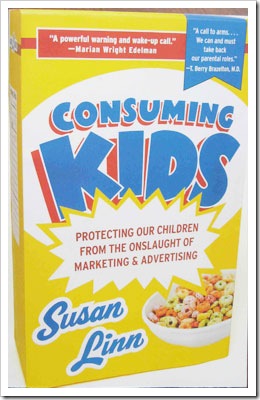TED - Inspired talks by the world’s greatest thinkers and doers 30 Mar 2008 6:43 PM (17 years ago)
 I’ve been following the lectures on TED for a couple of years, and I highly recommend it to anyone who is interested in ideas, technology and design.
I’ve been following the lectures on TED for a couple of years, and I highly recommend it to anyone who is interested in ideas, technology and design.
TED is an organisation that holds lectures by innovative thinkers, where you’ll often see people of notable prestige in the areas of science, health, and education. TED releases videos (almost daily) to the public, for free.
These videos; usually just 15 minutes in length, are sure to get you thinking about relevant issues and interesting new solutions.
Visit their website and open your world: http://www.ted.com/
New website to protect kids from junk food marketing 30 Mar 2008 6:35 PM (17 years ago)
 From the website:
From the website:
Children are vulnerable to advertising. They are less able than adults to fully understand that the purpose of advertising is not to inform but to persuade, and to ultimately sell a product.
Studies show that children are much more likely to want to eat food that comes in branded packaging than food with no branding – even if it is the same product.
A study of 3 to 5 year olds showed that over 75% of children preferred French fries in McDonalds branded wrapping, compared to the just over 10% who preferred fries from plain packaging - the food was exactly the same!. More info here; http://archpedi.ama-assn.org/cgi/content/full/161/8/792
The same study also showed that children with more TVs in their home were more likely to prefer the McDonalds-branded food packaging. An extensive survey of the evidence from the World Health Organization (WHO) confirms this.
The WHO report on Marketing of Food and Non-Alcoholic Beverages to Children explains that advertising promoting foods high in fat, sugar or salt directly influence children’s attitudes and behaviour – they want and ultimately eat these unhealthy foods. This can be a direct influence with children buying the foods, sweets and drinks themselves or asking their parents for these foods.
Visit the website here: http://junkfoodgeneration.org
Download the World Health Organization report : WHO - Marketing Junk food to kids (PDF file)
Experts say marketing of junk food to children must be restricted 30 Mar 2008 6:15 PM (17 years ago)
 Louise Baur, Professor of the Discipline of Paediatrics & Child Health at the University of Sydney and Consultant Paediatrician at The Children’s Hospital at Westmead, says that parents are struggling to be heard over the bombardment of marketing aimed at their children.
Louise Baur, Professor of the Discipline of Paediatrics & Child Health at the University of Sydney and Consultant Paediatrician at The Children’s Hospital at Westmead, says that parents are struggling to be heard over the bombardment of marketing aimed at their children.
From the article:
"Every week, in my weight management clinics at the hospital, I see parents who are trying their very hardest to look after the health of their kids" says Professor Baur. "By now, everyone has heard the alarming childhood obesity statistics. Parents are much better informed about healthy eating, and are trying to teach their children good nutritional habits. But how can they compete with slick, multi-million dollar marketing campaigns?
She dismisses suggestions that advertising doesn’t play a significant role in the diets of children. "Advertising does influence what kids want and therefore what parents buy - of course it does. Companies wouldn’t spend millions on it if it didn’t!"
Professor Baur points not only to television advertising, but to a range of marketing strategies from sponsorship of kids’ sporting events to "endorsements" of products by popular cartoon characters. She says that all levels of government have a role to play in supporting parents by introducing measures to restrict these marketing practices - and she isn’t alone.
The World Federation of Consumer Organisations, Consumers International, has this week released a new International Code on Marketing of Food and non-Alcoholic Beverages to Children, which is supported by the International Obesity Taskforce.
The Code calls for new government regulations to protect children and parents from the pressures of junk food marketing practices.
"This isn’t about being the "fun police", banning chocolate or soft drinks, or outlawing all forms of advertising" she says. "All we are asking is for some balance. Limiting the marketing of unhealthy food and drinks will give parents a better chance to teach their kids about responsible, healthy eating. We want to give children back to their parents. And that’s going to lead to happier families and healthier kids."
Full article here: http://www.usyd.edu.au/news/84.html?newsstoryid=2199
The Lunch Box Challenge 30 Mar 2008 6:09 PM (17 years ago)
In this event at the CI World Congress, 12 children were asked to choose the contents of their lunch box from a range of healthy and unhealthy options.
The results speak for themselves.
You can visit the Consumer International website here: http://www.consumersinternational.org/
Working out with The Slosh Tube 30 Mar 2008 6:04 PM (17 years ago)
The Slosh Tube is a bit of PVC pipe about 3 meters long, 4 inches thick, and filled with 20 litres of water. You can build one for approximately $20.
It’s surprisingly difficult to control the Slosh Tube, because the water in the tube is always moving around - just when you think you have it stabilised, the water moves again, throwing you all over the place.
I could really feel my entire mid-section getting a good thrashing - the balance required to hold this thing is incredible. I would recommend this to anyone who wants to improve their core strength and balance. Check out the photos (below) to see me and Owen getting completely owned by this evil device.

Check out Mark’s Daily Apple for videos and tips on making a Slosh Tube.
What it means to be truly fit 30 Mar 2008 5:56 PM (17 years ago)
If your goal is optimum physical competence then all the general physical skills must be considered:
1. Cardiovascular/respiratory Endurance - The ability of body systems to gather, process, and deliver oxygen.
2. Stamina - The ability of body systems to process, deliver, store, and utilize energy.
3. Strength - The ability of a muscular unit, or combination of muscular units, to apply force.
4. Flexibility - the ability to maximize the range of motion at a given joint.
5. Power - The ability of a muscular unit, or combination of muscular units, to apply maximum force in minimum time.
6. Speed - The ability to minimize the time cycle of a repeated movement.
7. Coordination - The ability to combine several distinct movement patterns into a singular distinct movement.
8. Agility - The ability to minimize transition time from one movement pattern to another.
9. Balance - The ability to control the placement of the bodies center of gravity in relation to its support base.
10. Accuracy - The ability to control movement in a given direction or at a given intensity.
Thanks to Jim Crawley and Bruce Evans of Dynamax, http://www.medicineballs.com
Seven different types of intelligence - trumps the classic IQ test 30 Mar 2008 5:52 PM (17 years ago)
 The originator of the theory of multiple intelligences, Howard Gardner, a professor of education at Harvard University, defines intelligence as the potential ability to process a certain sort of information. The different types of intelligence are for the most part independent of one another, and no type is more important than the other.
The originator of the theory of multiple intelligences, Howard Gardner, a professor of education at Harvard University, defines intelligence as the potential ability to process a certain sort of information. The different types of intelligence are for the most part independent of one another, and no type is more important than the other.
In all, Gardner identifies seven different types of intelligence. These can be summarised as follows:
1. Verbal = linguistic, e.g. lexical skills, formal speech, verbal debate, creative writing.
2. Body = kinesthetic (movement), e.g. body language, physical gestures, creative dance, physical exercise, drama.
3. Musical = rhythmic, e.g. music performance, singing, musical composition, rhythmic patterns.
4. Logic = mathematic, e.g. numerical aptitude, problem solving, deciphering codes, abstract symbols and formulae.
5. Visual = spatial, e.g. patterns and designs, painting, drawing, active imagination, sculpture, colour schemes.
6. Interpersonal (relationships with others), e.g. person-to-person communication, empathy practices, group projects, collaboration skills, receiving and giving feedback.
7. Intrapersonal (self-understanding and insight), e.g. thinking strategies, emotional processing, knowing yourself, higher order reasoning, focusing=concentration.
Form the book "THE COMPLETE BOOK OF INTELLIGENCE TESTS" by Philip Carter, Published by John Wiley & Sons Ltd 2005.
Opinion:
I remember running into this a few years ago, I was very intrigued at it’s premise. I have long suspected that the classic IQ test is inadequate - I have certain friends that are brilliant with their hands, or amazing musicians, yet the classic IQ test rates them as not-so-intelligent.
I assert; that the classic IQ test is a dangerous touchstone because of it’s authoritative position in society - some people score well and can erroneously conclude that they are of superior intelligence (which is a classic characteristic of incompetence), yet other people may score low on the test and internalise an inferior sense of competence.
I favour Howard Gardner’s proposal, as it accounts for relevant variables that the class IQ Test dismisses.
The Flip Side to the Obesity Epidemic 30 Mar 2008 5:36 PM (17 years ago)
 Dr Martin Donohoe MD FACP has researched the body image problem that is ubiquitous throughout western civilisation. He has uncovered some interesting statistics.
Dr Martin Donohoe MD FACP has researched the body image problem that is ubiquitous throughout western civilisation. He has uncovered some interesting statistics.
From the article:
As many as 66% of women and 52% of men have reported feelings of dissatisfaction or inadequacy regarding their body weight.[4] Sixty percent of girls in grades 9-12 are trying to lose weight, compared with 24% of boys.[4] The number-one wish of girls aged 11-17 is to lose weight.[5] Women are more likely to judge themselves as overweight when they are not, whereas men are the opposite.[6] Women who desire to lose weight are more likely to do so in the hopes of improving their appearance, whereas men who wish to lose weight are more likely to be concerned about their future health and fitness.[7]
Body-image distress is now classified as a psychological disorder. Five percent to 10% of females have an eating disorder such as anorexia nervosa or bulimia.[4] Male and female high school athletes are especially at risk for unhealthy weight-control behaviours, such as restricting food intake, vomiting, over-exercising, using diet pills, inappropriately taking prescribed stimulants or insulin, and using nicotine.[8] Some adolescents dehydrate by restricting fluid intake, spitting, wearing rubber suits, taking daily steam baths and/or saunas, and using diuretics or laxatives.[8]
Consequences of abnormal weight-loss behaviours include delayed maturation, impaired growth, menstrual irregularities or loss of menses, increased rates of infection, eating disorders, and depression. Alternatively, such behaviours can be a sign of depression or verbal, physical, or sexual abuse.[9,10]
Media images have contributed to a misguided perception of the "ideal" body. Today, models weigh 23% less than average women; in 1986 it was only 8%.[11] Modelling schools for teens create unrealistic expectations. Only a very "select" few models achieve financial success (of these select few, beginners earn $1500 per day, those in the top tier $25,000 per day, and supermodels $100,000 or even more per day).
The full story:
http://www.medscape.com/viewarticle/571497_print
Further Reading:
http://www.marksdailyapple.com/skinny-fat/
Are you a home scientist? 30 Mar 2008 5:20 PM (17 years ago)
 If you are a home scientist - fascinated with how things works, and curious about fields such as Biology, Geography, Chemistry, Physics, Astronomy (not astrology!), and the Earth Science… then check out these great websites;
If you are a home scientist - fascinated with how things works, and curious about fields such as Biology, Geography, Chemistry, Physics, Astronomy (not astrology!), and the Earth Science… then check out these great websites;
Biology: http://www.biology4kids.com/
Astronomy: http://www.cosmos4kids.com/
Chemistry: http://www.chem4kids.com/
Geography: http://www.geography4kids.com/
Physics: http://www.physics4kids.com/
Don’t be put off by the ‘for kids’ label - these websites are a great place to start or brush up on your science knowledge. They also make a great starting point for more thorough research, and what I like about these websites the most is; they talk in terms of systems i.e. they explain how things interact in the world - rather than just in a dish, or under a microscope.
If you want to take things a step further, then check out ‘The Teaching Company’ at http://www.teach12.com/, however, they are not free. So, you could also check out Wikipedia at http://www.wikipedia.org/ for free information.
Wikipedia is great as a starting point for further research on whatever topic you’re pursuing. I say starting point because Wikipedia offers external links and references which are sometimes far more valuable than the information listed on the page.
Another great resource for learning is ‘Google Scholar’ http://scholar.google.com.au/. Google Scholar is a search engine that lists scientific documents for whatever search terms you use - which is excellent for sourcing evidence (for and against) your research.
Learning how the world works is a wonderful way to get to know yourself… yes, yourself. A feeling of being connected with the world usually emerges from scientific study - so I encourage you to become a home scientist, and enjoy the amazing world we live in.
Not getting enough sleep? Welcome to the machine… 10 Feb 2008 6:07 PM (17 years ago)

A recent report from the Woolcock Institute of Medical Research has confirmed what most people are already painfully aware of; not getting enough sleep.
From the report:
Almost a fifth of NSW’s adult population doesn’t get enough sleep according to research to be published this month in international publication Internal Medicine Journal.
With 11.7% experiencing excessive daytime sleepiness and 18.4% reporting sleeping less than 6.5 hours per night. the study warns the impact of sleep and sleepiness on the public health could be
large.
Results found excessive daytime sleepiness was most commonly associated with short sleep durations, getting older and symptoms of insomnia and depression.
Dr Delwyn Bartlett, Sleep Psychologist at the Woolcock Institute of Medical Research and chief author of the paper, explains short sleep, either self-imposed or forced, is being increasingly recognised as a contributor to impaired health and increased death in the community. “It can impact on everything from cardiovascular disease, type-2 diabetes, insulin sensitivity, appetite, immune responses to vaccinations and concentration levels for even the simplest tasks,” she said.
“If the NSW figures are reflective of the nation as a whole, chronic sleep restriction is likely to
have a major impact on Australian public health.” Dr Bartlett says.
My opinion:
Society exploits people… and does so by appealing to our animal instincts. Our consumerist culture with it’s attitude of "more, more, more!" convinces us to work longer hours to buy a bunch of stuff that we really don’t need, and usually that stuff will not bring any lasting happiness. Alain De botton summed it up well in his book and documentary aptly titled "Status Anxiety" in which he observes the anxiety about what others think of us; about whether we’re judged a success or a failure, a winner or a loser. He writes:
"A sharp decline in actual deprivation may – paradoxically – have been accompanied by a continuing and even increased sense of deprivation and a fear of it. Populations blessed with riches and possibilities far outstripping those imaginable by their ancestors tilling the unpredictable soil of medieval Europe have shown a remarkable capacity to feel that both who they are and what they have are not enough."
But for now, we’re sold on it, and we’ll keep consuming energy drinks and high sugar foods so we can work longer hours to get the stuff that we don’t really need.
Perhaps someday in the future people will look back on the 21st century in disbelief and horror at the exploitation people suffered. Perhaps they will think we’re idiots… and I wouldn’t blame them.
So what we can we do about it? Firstly, I would recommend getting out into the wilderness and looking around. Take notice of all the things that are free… oh yeah, that would be everything.
Secondly, I would think of the times in your life when you were genuinely happy, because the chances are that they weren’t based on money. Some of my greatest memories involve times in my life where I was flat broke.
And last but not least, tell all the proverbial "Jones’s" to shove their have and have-not mentality up their butt. That is, if their head isn’t taking up all the space.
We live in strange times, where slavery; rather being enforced, is chosen. You do have a choice… yes you do.
